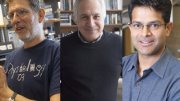Recognizing their “distinguished and continuing achievements in original research,” the National Academy of Sciences on April 29 announced the election of 84 new members, 11 of them from Harvard’s faculties of arts and sciences and of medicine.
Joining the academy from Harvard Medical School are:
- Bruce P. Bean ’73, Winthrop professor of neurobiology;
- Emery N. Brown ’78, M.D. ’87, Ph.D. ’88, Zapol professor of anaesthesia, who is affiliated with Massachusetts General Hospital;
- Timothy J. Mitchison, Sabbagh professor of systems biology;
- Vamsi K. Mootha, M.D. ’98, professor of systems biology and of medicine, who is affiliated with Massachusetts General Hospital; and
- Martin R. Pollak, professor of medicine, who is affiliated with Beth Israel Deaconess Medical Center.
The new members from the Faculty of Arts and Sciences are:
- Daniel Eisenstein, Ph.D. ’96, professor of astronomy;
- Drew Fudenberg,’78, RI ’10, Abbe professor of economics;
- Lawrence F. Katz, Allison professor of economics;
- Jeff W. Lichtman, Knowles professor of molecular and cellular biology and Ramon y Cajal professor of arts and sciences;
- Andrew W. Murray, Ph.D. ’84, Smith professor of molecular genetics; and
- Subir Sachdev, professor of physics.
Visit Harvard Magazine’s archives to find articles about economist Katz’s research with his frequent collaborator, Lee professor of economics Claudia Goldin, on career choice and quality of life issues; biologist Lichtman’s work involving optical microscopy and neural synapses; and short profiles of biologist Mitchison and Murray.
Eleven alumni were also newly elected to the academy. They are:
- Peter Bearman, Ph.D. ’85, Cole professor of the social sciences at Columbia;
- Dale L. Boger, Ph.D. ’80, Cramer professor of chemistry at The Scripps Research Institute;
- Eric A. D’Asaro ’76, S.M. ’76, senior principal oceanographer and professor of oceanography at University of Washington, Seattle;
- Gregory C. Fu, Ph.D. ’91, Altair professor of chemistry, California Institute of Technology;
- Samuel H. Gellman ’81, Hirschmann professor of chemistry, University of Wisconsin, Madison;
- Timothy L. Grove, Ph.D. ’76, professor, department of earth, atmospheric, and planetary sciences, Massachusetts Institute of Technology;
- Benjamin D. Hall, Ph.D. ’59, emeritus professor of biology and genome sciences, University of Washington, Seattle;
- Michael N. Hall, Ph.D. ’81, professor, Biozentrum, University of Basel;
- John Preskill, Ph.D. ’80, Feynman professor of theoretical physics, California Institute of Technology;
- Joseph Silk, Ph.D. ’68, HomeWood professor, Johns Hopkins University, and professor, Institut d’Astrophysique, Université Pierre et Marie Curie, Paris; and
- Montgomery W. Slatkin, Gompertz professor of integrative biology, University of California, Berkeley.









